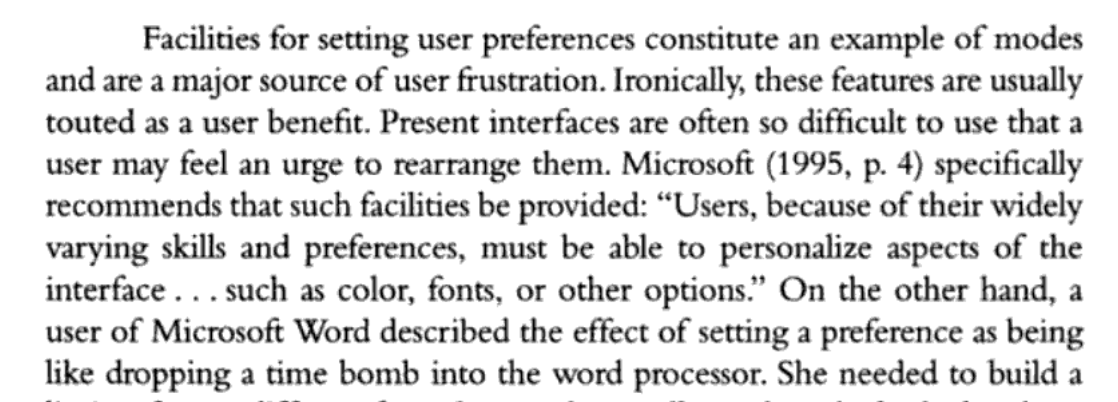Fascinating section in The Humane Interface by Jef Raskin, arguing against software customization.
I don& #39;t agree with his conclusion, but he still raises some great points. Some thoughts: ⬎
I don& #39;t agree with his conclusion, but he still raises some great points. Some thoughts: ⬎
Quick caveat before jumping in: I don& #39;t think it& #39;s productive to ask "is software customization good or bad?", although that might fit better into 280 chars
Much more fun to consider: when is it good, for whom, in what contexts, what are the tradeoffs... ⬎
Much more fun to consider: when is it good, for whom, in what contexts, what are the tradeoffs... ⬎
Alright, diving to the heart of the matter:
For Raskin, the "central point" is this: if the designer can make an "optimal" interface, why would you let the user mess with it? They can only screw it up. ⬎
For Raskin, the "central point" is this: if the designer can make an "optimal" interface, why would you let the user mess with it? They can only screw it up. ⬎
I think this idea of a single "optimal" interface really gets at the core tension here: how much do people& #39;s needs really vary?
The Air Force found out that there& #39;s no single optimal cockpit seat for every pilot: ⬎
The Air Force found out that there& #39;s no single optimal cockpit seat for every pilot: ⬎
The more variance in people& #39;s needs, the more this idea of an "optimal interface" falls apart:
* niche professional tasks where people have very specific needs
* people w/ disabilities, further from the average ⬎
* niche professional tasks where people have very specific needs
* people w/ disabilities, further from the average ⬎
On the other hand, there are (mostly) universal truths that hold across humans, many of which Humane Interface eloquently explains.
Seems like the key question here is, how much do people& #39;s needs vary in a given domain? ⬎
Seems like the key question here is, how much do people& #39;s needs vary in a given domain? ⬎
Here Raskin makes 3 claims: 1) customization sounds nice and fun and all. 2) But it doesn& #39;t improve productivity, 3) and it harms learnability. Let& #39;s take each of those arguments in turn. ⬎
His first point hits hard. I often worry that I want customizable software because it& #39;s fun, and this is dangerous if we& #39;re deluded into thinking we& #39;re making useful things.
But, it& #39;s worth remembering that fun can be a goal too: ⬎ https://twitter.com/geoffreylitt/status/1254774726074884096">https://twitter.com/geoffreyl...
But, it& #39;s worth remembering that fun can be a goal too: ⬎ https://twitter.com/geoffreylitt/status/1254774726074884096">https://twitter.com/geoffreyl...
Second point: there& #39;s no evidence customizability improves productivity.
Maybe true, but my own experience as a programmer makes me extremely skeptical of this claim. I think it& #39;s clear that customizability can improve productivity, in the right contexts. ⬎
Maybe true, but my own experience as a programmer makes me extremely skeptical of this claim. I think it& #39;s clear that customizability can improve productivity, in the right contexts. ⬎
Third point: customization harms learnability. This one seems generally correct to me. So then it becomes a question of learnability vs usability. For power tools, learnability matters less. ⬎
quick sidenote: getting a bit tired of learnability being prioritized infinitely higher than utility. I have a ton of respect for learnable design, but feels like "no manual necessary" is dogma now, built on assumption of web apps that people are only using for a few minutes ⬎
OK, few more points from Raskin:
Customization creates modes, and modes are very very evil. Set something in Word preferences, and it& #39;s a "time bomb" ⬎
Customization creates modes, and modes are very very evil. Set something in Word preferences, and it& #39;s a "time bomb" ⬎
I see the point here, and have had bad experiences with hidden config. But also, calling it a "mode" feels slightly off to me -- once I set up a config, it& #39;s often fixed for years and I build muscle memory around it. Not modal in the moment. ⬎
Raskin points out we need stability in our software.
Totally agree! In fact, this is a common reason that people customize software -- to change it back after an unavoidable upgrade (see this paper by Wendy Mackay https://www.lri.fr/~mackay/pdffiles/CHI91.Triggers.pdf)">https://www.lri.fr/~mackay/p... ⬎
Totally agree! In fact, this is a common reason that people customize software -- to change it back after an unavoidable upgrade (see this paper by Wendy Mackay https://www.lri.fr/~mackay/pdffiles/CHI91.Triggers.pdf)">https://www.lri.fr/~mackay/p... ⬎
I have a lot of respect for Raskin, Humane Interface is a fantastic book. And the Macintosh was pivotal for empowering more people to use computers. So I think his critique is worthy of serious consideration for anyone who wants more malleable software...
Also, always fun to realize that you& #39;ve already read a page in a book on Twitter...  https://abs.twimg.com/emoji/v2/... draggable="false" alt="🙃" title="Upside-down face" aria-label="Emoji: Upside-down face"> some good discussion of this here: https://twitter.com/stevekrouse/status/1229883092606869508">https://twitter.com/stevekrou...
https://abs.twimg.com/emoji/v2/... draggable="false" alt="🙃" title="Upside-down face" aria-label="Emoji: Upside-down face"> some good discussion of this here: https://twitter.com/stevekrouse/status/1229883092606869508">https://twitter.com/stevekrou...

 Read on Twitter
Read on Twitter








